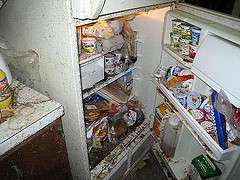Be cautious with food after floods, expert advises

After floods strike, people try to salvage what they can from their affected homes, shops and gardens. However, they should play it safe when it comes to food, according to a food-safety expert in Penn State's College of Agricultural Sciences.
Flood waters can carry a wide variety of hazardous materials -- everything from poisonous chemicals to pathogenic bacteria, noted Martin Bucknavage, extension food-safety specialist. It can contaminate every food item it touches.
"Never eat food that has come into contact with flood waters," he said. "Even food in jars with screw-cap lids should be thrown out because materials can get under the lid area and can be very difficult to clean. It is never worth the risk of trying to salvage a jar of relish or a bottle of ketchup."
Undamaged, commercially prepared foods in all-metal cans or sealed pouches may be salvaged if needed, but only after the containers have been thoroughly washed in hot, soapy water, rinsed and then sanitized in a chlorine bleach solution. "Before washing these cans, the labels should be removed, and then after washing, sanitizing and air drying, the containers should be relabeled," Bucknavage said.
"Use these products immediately. Throw out any metal containers that are damaged, rusted, swollen or unable to be cleaned. Also throw away all baby food -- no matter the type of container."
If you have food in an unaffected refrigerator or freezer, but that unit has lost power, check the temperature of the products inside, he advised. If the refrigerated food is below 40 degrees Fahrenheit, or the frozen food is still frozen or at a temperature below 40 F, it still should be safe.
"But if that temperature for refrigerated foods has been over 40 F for two or more hours, discard those foods," he said. "There are a few exceptions -- foods that still will be safe -- such as acidic items like vinegar-based dressings, or foods like peanut butter. Other exceptions would be concentrated juice and frozen bakery items."
No produce from a garden that has been exposed to flood waters should be consumed, Bucknavage pointed out.
He warned that drinking water in flood-affected areas is a serious concern. "Only use bottled water that has not been exposed to flood waters," he advised. "If bottled water is not available, water will need to be boiled for at least one minute. If it has an off odor or is cloudy, avoid using it.
"If your water comes from a well that you suspect has been contaminated with flood water, that well should be disinfected and tested before resuming it to use."
Wash thoroughly with hot, soapy water all pots, pans, ceramic dishes and metal utensils that came into contact with water, and rinse with clean water, Bucknavage urged. "Then sanitize these items by boiling in clean water or immersing them in water with chlorine bleach," he said. "Use one tablespoon unscented bleach per gallon of water."
Countertops should be washed and sanitized as well. Affected plastic and wooden containers should be thrown away.
"Remember, never taste food to determine if it is safe," Bucknavage said. "If there is any question about the safety of a food item, throw it out. For more information, contact your local Penn State Extension office."















